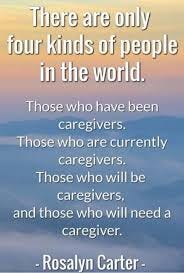Thriving as a caregiver
Can It Be A Positive Experience?

I didn’t want to be a caregiver, wasn’t prepared, didn’t take care of myself, and made many mistakes. Most of the time, I reacted rather than responding, had a vague plan, and adjusted, but I survived. Since then, I’ve wondered if there was a way to develop and grow during my time as a caregiver.
I would care for Dan again, but with an approach that allows me to thrive rather than just survive - to be at peace, in control of the situation, and compassionate with both of us.
AARP research says that nearly 48 million family caregivers are in the US, a significant issue for many. As Rosalyn Carter says
The Family Care Alliance website says if a person is a caregiving spouse between the ages of 66 and 96 experiencing mental or emotional strain, they have a risk of dying that is 63 percent higher than that of people that age who aren’t.
That site offers words of wisdom.
On an airplane, an oxygen mask descends in front of you. What do you do? As we all know, the first rule is to put on your oxygen mask before assisting anyone else. Only when we first help ourselves can we effectively help others.
Caring for yourself is one of the most important—and often forgotten—things you can do as a caregiver. When your needs are taken care of, the person you care for will benefit, too.
If I were to care for Dan again, I would do the same.
Put Me First
Self-Care
Intellectually, I knew the value of self-care, but it took on a whole new meaning when I was actually caring for a loved one. Self-care and setting boundaries would be a higher priority.
Websites and books suggest practices, such as regular breaks, hobbies, and support from friends or groups. They also discuss fostering positive relationships, journaling, and spending time in nature to promote relaxation.
I tried most of those suggestions, but caring for Dan became a 24/7, draining job with little time for me or outside pursuits. He wouldn’t let a stranger in the house, so respite care wasn’t an option. I got breaks only when our adult children visited because he trusted them. His well-being was always on my mind. I needed to do more for myself, though.
That was eight years ago. Additional resources are available today: books, websites, and videos offer excellent ideas and suggestions. I’d create a library of options because not all work; situations change, and what worked today might not work tomorrow.
Boundaries
I’d figure out what I could handle and what I needed help with and then set limits. Establishing them and sharing the information with others would help alleviate my guilt and gauge when help or other arrangements were necessary.
I would also set realistic expectations, prioritize my time, and ask for help sooner.
Caring For Dan
Then, I’d be in a better position to care for Dan as he struggled with dementia—developing a plan that met both our needs. In addition to the daily issues and chores, the plan would include being more assertive and doing things daily to help maintain our positive attitude.
Be Assertive
I’d be more assertive with professionals, family, and friends. It was not my nature at the time.
I’d also be more assertive with Dan. We had been a team. Initially, I tried to care for him as his wife. It didn’t work. We weren’t a couple in that way anymore; I had to be a parent because he was the child, so I had to tell him what to do rather than asking him or negotiating a shared decision.
Maintain a Positive Attitude
Many websites have ideas, techniques, and strategies for helping caregivers maintain a positive outlook. Sometimes, I was compassionate and gentle; other times, I was frustrated, irritated, and, oh, so discouraged. His mood reflected mine, so maintaining hope, finding the good, and having a can-do attitude will be musts.
I’d change my thinking from "I should or have to take care of him" to "I want to." That might allow me to be more compassionate.
The website Caregivers: Be Realistic, Think Positive offers solid advice. These ideas stood out to me.
Have confidence in your role as a caregiver. Assure yourself: “It’s a tough job, but I can do it.” Think in favorable terms.
Own your feelings. You might feel sadness, anger, resentment, or fear. All of those feelings are valid - feel them.
Listen to your body. Your body will tell you when you need food, exercise, rest, or medical attention. Give your body what it needs. It’s essential to recharge your batteries.
In retrospect, I tended to ignore my needs when caring for Dan. If I were to care for him again, I would address both of our needs and hopefully thrive throughout such a challenging time - keeping in mind this is a marathon, not a sprint.
P. S. I’d love to have you share the Aging Well Newsletter with others. I want to bring the lessons I’ve learned through the years of life and caregiving to as many people as possible. More than anything, I want to continue to expand our community of readers.
So please forward this email to a friend and invite them to join us. They can subscribe here:
Thank you for being part of the Aging Well community. If you want to contribute to my work, consider donating to the Alzheimer's Association. This link takes you to their website. The choice is yours.




Can caregiving be a positive experience?
Lots of wisdom here! Thank you for this.